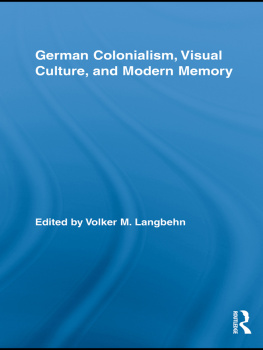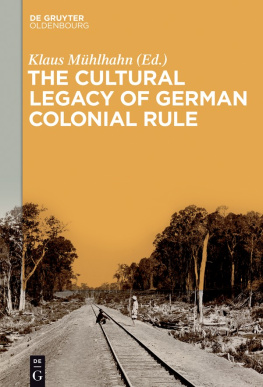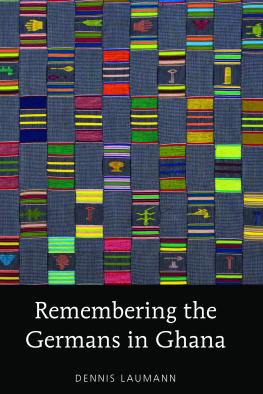THE GERMAN COLONIAL
EXPERIENCE
Select Documents on German Rule in Africa, China, and the Pacific 18841914
Edited by
Arthur J. Knoll and Hermann J. Hiery

Copyright 2010 by
University Press of America, Inc.
4501 Forbes Boulevard
Suite 200
Lanham, Maryland 20706
UPA Acquisitions Department (301) 459-3366
Estover Road
Plymouth PL6 7PY
United Kingdom
All rights reserved
Printed in the United States of America
British Library Cataloging in Publication Information Available
Library of Congress Control Number: 2010920260
ISBN: 978-0-7618-3900-2 (paperback : alk. paper)
 The paper used in this publication meets the minimum
The paper used in this publication meets the minimum
requirements of American National Standard for Information
SciencesPermanence of Paper for Printed Library Materials,
ANSI Z39.48-1992
Front Cover.
Top Right: The Harbor of Victoria in the Cameroons. German Postcard, Sammlung Hiery.
Bottom Right: Cover illustration: His Majestys Ship Albatross as a hydrographic surveying vessel in the German Pacific. German Postcard, Sammlung Hiery.
Left: German Colonial Rider in Southwest Africa. German Postcard, Sammlung Hiery.
Contents
Preface
This documentary collection seeks to provide its readers with the salient features of modern German extra-European colonization. It explores, through documents, how the Germans gained, explored, pacified, ruled, exploited and finally lost their colonies in the First World War. This survey draws upon documents from around the world which are normally not accessible to readers since they are in archives as far distant as Africa and Oceania. The volumes function is to illuminate and illustrate important aspects of German imperialism as these changed through time, and to determine how the subject populations both acted and reacted to the conditions imposed by colonial rule, often in order to strengthen their own influence. We also show how the Germans ran the day-to-day affairs of government, what their vision for Africans and Pacific Islanders was, and what values, if any, they sought to inculcate in the colonized. If the documents reveal the uniqueness of the German effort, they also demonstrate that in like circumstances Germans acted much like their French and British imperial counterparts when faced with similar difficulties.
In organizing this collection for publication the editors have pursued an overall topical grouping of documents in preference to a geographical organization based upon the individual African and Pacific colonies. However, within the thematic division there is a geographical division of the colonies because, although the Germans tried to administer their empire as a unity, they often tailored rule to conditions on the periphery. Thus, the documents always start with West Africa (Togo, Cameroon), then Southwest Africa, East Africa, the Pacific (New Guinea, Micronesia, Samoa) and end with the naval leasehold in China (Kiaochow). Preferring to see the colonized as a totality with common attributes, who thus might be dealt with uniformly, the great distance from the German capital and haphazard communication meant that German administrators on the spot had considerable freedom which they utilized to adjust to regional peculiarities. Special conditions in each colony often made it necessary for officials to adapt to local practice, a pragmatic imperial orientation which aided in the preservation of indigenous identity.
We owe debts of gratitude to the many people who have provided the ideas, motivation, and intellectual support for this project: former Professor Harry R. Rudin of Yale University pioneered investigations in the field of German imperialism; former Senior Fellow Lewis H. Gann of the Hoover Institution on War, Revolution and Peace who urged us on; former Senior Fellow at Hoover, Peter Duignan, who always supported this project in so many ways. Professor Emeritus Raymond Betts of the Humanities Institute of the University of Kentucky always stood ready to advise us in our efforts. In terms of fiscal support, The University of the South has proved unstinting in its efforts as has the Appalachian Studies Association of Berea, Kentucky. In Germany the Alexander von Humboldt Foundation through its research grants permitting study in Germany and through its TRANSCOOP program, which sends young German researchers to the United States, has been a very generous supporter of this project. In fact, without the aid from the Alexander von Humboldt foundation this project could not have been undertaken. We also wish to thank the many archives which granted us access to documents in their holdings: from Berlin and Koblenz and various mission archives in Germany to London, Accra, Lome, Apia, Canberra and Wellington. Finally, we gratefully thank the staff of the Chair in Modern History of the University of Bayreuth, particularly Messers. Marco Hedler, Matthew Metcalfe, and Marcus Mhlnikel, for their help in proofreading the manuscript, and above all Frau Gabi Krampf for her heroic text-editing. Without their cooperation, these tasks could not have been completed.
The editors feel that it is particularly fitting that this documentary collection be completed during the 125th centenary of German overseas colonialism, as a tribute not only to those who served abroad, but also to those who bore the burdens of imperial rule.
Sewanee and Bayreuth, November 2009
Arthur J. Knoll and Hermann J. Hiery
Introduction
Germany was one of Europes unique colonial powers. She was the last of the great powers to enter the colonial scramble in 1884 and the first to leave empire in 1918 (legally in 1920/21). As a result the mother country had little opportunity to derive much material benefit from the colonies. The expected rewards for Germany from plantations in East Africa or minerals from Southwest Africa never really materialized (except for the profits made by a select few investors) and, as a result, Germanys trade with her colonies remained small. It amounted to only 0.5 percent of her total foreign trade in 1913. German investors and merchants seemed much more interested in the securities of American and Canadian railroads, in the government bonds of Latin American countries, in railroads in the Ottoman Empire, or even in the colonies of the other European powers, than they were in their own colonial possessions.
In terms of trade, Germany exported five times as much to Belgium in 1912 as it did to all of her colonies. An economic rationale for empire was therefore difficult to adduce and Reichstag members from the Left and Catholic Center, who were certainly well informed, objected to the taxation of Germans for the supposed benefits of empire.
Since the costs of establishing infrastructure were great, and the risks for imperial investors correspondingly risky, German finance capital was also not attracted to empire. Contrary to Lenins belief that the German great banks were major proponents of imperialism because of the need to unload surplus finance capital profitably abroad, these banks never showed much enthusiasm for the overseas empire which Emperor Wilhelm II reckoned as an integral part of his New Course. This abstinence of capital proved embarrassing for Colonial Secretary Dernburg (1906-10), himself a banker, who had to appeal to the patriotism of his wealthy friends to get them to invest in empire. When German investors did turn to Africa, they put more money in South Africa and in Egypt than they did in their own colonies.in Africa. Consequently, the German New Guinea Company dominated the foreign trade of Melanesia while the Jaluit Company was most important in the Marshall Islands.












 The paper used in this publication meets the minimum
The paper used in this publication meets the minimum